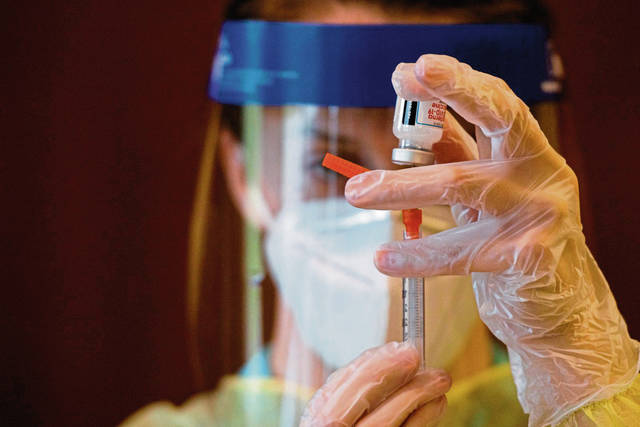As covid-19 vaccination efforts ramp up, health experts are urging people not to skimp on mitigation measures even after they receive the vaccine.
Optimism about the vaccine is warranted, but that doesn’t mean vaccinated people should disregard mitigation efforts like mask wearing and social distancing, said Dr. Graham Snyder, UPMC’s medical director of infection prevention and hospital epidemiology.
“I hope the vaccine is giving people some optimism about decreasing your chances of getting sick — and that’s important, because it does — but we have to do masking and distancing to protect the most vulnerable,” Snyder said. “I’ve seen a lot of people saying, ‘I got the vaccine, hooray, I’m free.’ We’re really trying to merge optimism along with a reminder that we have to mask and distance until the virus is under control.”
In clinical trials, vaccines from Moderna and Pfizer — which have both earned emergency-use authorization from the FDA — were about 95% effective at stopping symptomatic disease, Snyder said. Even those vaccines, which Snyder said “far exceed” expectations, cannot offer a 100% guarantee that a vaccinated individual won’t get sick.
Johnson & Johnson is seeking approval for its one-dose shot, which was shown to be 66% effective against moderate to severe covid-19 in clinical studies.
Vaccines, including those from Moderna and Pfizer, may not be adept at cutting virus transmission. As Snyder explained, individuals who get the vaccines are significantly limiting their chances of getting sick, but they could still be spreading the virus to others.
“We don’t entirely know how well the vaccines prevent someone from being contagious,” Snyder said. “It’s entirely possible that if I’m fully vaccinated, the vaccine is very good at protecting me from getting sick, but it might not protect me from being contagious.”
The behavior of vaccinated individuals should reflect the fact that they could still be spreading the virus to those who are not vaccinated, said Dr. Thomas Walsh, an infectious disease specialist and medical director of Allegheny Health Network’s antimicrobial stewardship program.
“The vaccine — while it is 95% effective at stopping symptomatic disease in the person who receives it — we don’t know how well it keeps us from developing asymptomatic infection and transmission to others,” Walsh said. “But we know it won’t be 100%. No vaccine is.”
AstraZeneca and the University of Oxford recently released preliminary findings that, while not yet peer-reviewed, appear encouraging. The findings suggested their vaccine not only prevents severe disease, but also may cut virus transmission by two-thirds.
But that still is not 100% effective in stopping the spread of the virus.
“The vaccines are not foolproof,” Walsh said.
New variants of the virus have recently cropped up, sparking new fears of a more contagious strain. While the vaccines seem to do well combating those variants, it is possible they provide less efficacy on emerging strains, Walsh noted.
With the virus still spreading and vaccine rollout off to a slow start, experts said it’s imperative that people continue following key mitigation measures even after they’ve been vaccinated.
“Right now, receipt of the vaccine really shouldn’t change any of our other mitigation strategies,” Walsh said. “The vaccine is one tool in the toolbox – it’s maybe our most important tool, but it doesn’t mean we pick up this and throw out everything else.”
Snyder said vaccines will work in in tandem with treatments and basic prevention strategies — like face masks, social distancing measures and hand hygiene — to stop the virus.
It’s impossible to calculate exactly how many people will need to be vaccinated before masking and social distancing measures can be eased, Snyder said.
“There are some studies that have postulated how many people have to be immune for the virus to peter out, but there isn’t really one number in nature. It depends on the size of the community and the number of social interactions,” he said.
Walsh agreed that there’s no fixed number that would determine when enough people have been vaccinated to achieve herd immunity or relax mitigation efforts.
“Herd immunity takes a lot of variables into account that we’re just not going to be able to give a hard number on that,” he said, adding that more people getting vaccines and a quicker vaccine rollout would help expedite the process.
If people get vaccinated and continue to abide by mitigation efforts, Walsh said, the pandemic could come to an end quicker.
“When we want to get back to normal, we need that viral transmission to really fall off and we’re not going to be able to do that with vaccination alone,” Walsh said. “It doesn’t replace everything else that we have. It is critically important. It’s what’s going to get us to the other side. But if we throw out all the other mitigation strategies, it’s going to be a lot of pain for a long time. The quickest way to get to the other side is using it in conjunction with all the mitigation measures.”








